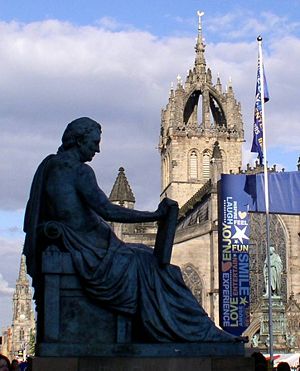David Hume: Difference between revisions
Jump to navigation
Jump to search


imported>Joe Quick m (subpages) |
imported>Gareth Leng No edit summary |
||
| Line 1: | Line 1: | ||
{{subpages}} | {{subpages}} | ||
David Hume (April 26, 1711 – August 25, 1776) was a Scottish philosopher, economist, and historian. He is considered one of the most important figures in the history of Western philosophy and the [[Scottish Enlightenment]]. Although in recent years interest in Hume's work has centred on his philosophical writing, it was as an historian that he first gained recognition and respect. | David Hume (April 26, 1711 – August 25, 1776) was a Scottish philosopher, economist, and historian. He is considered one of the most important figures in the history of Western philosophy and the [[Scottish Enlightenment]]. Although in recent years interest in Hume's work has centred on his philosophical writing, it was as an historian that he first gained recognition and respect. | ||
[[Image:Hume.jpg|thumb|right|Statue of David Hume. ''"Man is a reasonable being; and as such, receives from science his proper food and nourishment: But so narrow are the bounds of human understanding, that little satisfaction can be hoped for in this particular..."'' | |||
Hume recognised clearly the difficulties in gaining a general understanding merely by accumulating observations.]] | |||
Revision as of 07:44, 22 November 2007
David Hume (April 26, 1711 – August 25, 1776) was a Scottish philosopher, economist, and historian. He is considered one of the most important figures in the history of Western philosophy and the Scottish Enlightenment. Although in recent years interest in Hume's work has centred on his philosophical writing, it was as an historian that he first gained recognition and respect.

Statue of David Hume. "Man is a reasonable being; and as such, receives from science his proper food and nourishment: But so narrow are the bounds of human understanding, that little satisfaction can be hoped for in this particular..." Hume recognised clearly the difficulties in gaining a general understanding merely by accumulating observations.